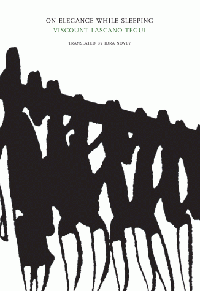 On Elegance While Sleeping
On Elegance While Sleeping
by Viscount Lascano Tegui
Dalkey Archive, 2010
174 pages / $13.95 Buy from Dalkey Archive or Amazon
On Elegance While Sleeping is a decadent and deranged Argentinean novel, first published in 1922 and spanning four years in the life of an aesthete whose fluid diary entries function as a recollection of dreams, memories, visions, sexual fantasies, mundane observations, musings on death and the animal kingdom. These vignettes have the cumulative effect of a fractured psyche indulging in its own incompleteness. Sinister and surreal, each locution is touched by the flavor of elegance. It is a fantastic and dark marvel of a libertine’s fractured psyche, a damaged consciousness. Tegui’s novel feels like a spiritual cousin to Pessoa’s The Book of Disquiet and Rilke’s The Notebooks of Malte Laurids Brigge, these short and intensely interior novels deal in the anguish and ecstasy of poetry and isolation. Tegui writes, “Novelists overplay their hands when they put an end to their characters with some catastrophe—a terrible fire, a murder, what have you. They don’t trust in the asphyxiating monotony of everyday life.” But this novel has a darkness and subversive element that extends beyond sheer idleness, making it feel like the Argentinean counterpart to such subversive decadent classics as Maldoror, Aurélia, and A Rebours.
Tegui’s novel deals in the aesthetics of delusion, and the elements of the imagination that can lead a man to crime. The author, self-described as “a somewhat delicate individual,” adopts the pose of a consummate gentleman, even in his moments of utter derangement, even while plotting a murder. Tegui’s novel acts as a decadent master class of a disconnected lost soul – a deranged aesthete obsessing over disease, sex, and the tyranny of death. The novel takes the form of a diary, full of fragmented musings on poetics and style. The diarist desires to do something “flamboyant, coarse, unexpected—something that will impose its tyranny over my life without question. I’m going to kill someone.”
The unnamed diarist, who reveals that “a book is a secret vice,” aspires to write a book he titles The Syphilis of Don Juan, which he describes as a “symptomatic journal of my disease that could serve as a source of information for doctors and literary types both,” playfully and ambiguously complicating the relationship between Tegui and the diarist. The diarist muses, “But wouldn’t my book be the result of my desire to commit a crime, and thus be a part of it? Wouldn’t every page be a sliver of glass in the daily soup of my fellow citizens?” before coming to the conclusion: “A book is a slow, unavoidable catastrophe.” In other words, his creative impulse is indistinguishable from his criminal impulse. The diarist is flirting with insanity and planning a senseless murder. Tegui muses over the interior lives of what he calls “armies of the perverse,” sexual deviants, vampires, the death-obsessed, the ill, decadent aesthetes, in other words, people much like himself: men of an ill humor well-versed in the dark art of oblivion.
“The children of degenerates step into life before other children. They start living centuries earlier. Health means nothing more than living in normal time. A broken watch ticks more often than one in perfect condition. It lives more. The children of the abnormal are mortgages owed by their parents. They’re born old. Born intelligent to the point of insanity. Sensitive to the point of silence. They’ve lived in their mother’s bellies, their father’s blood, for years and years of an exhausting sensuality. They’re born with severe and well-worn faces. Their eyes are already jaded, as if they’ve seen too many Corot landscapes and gray was the only color in their cosmologies. Their hands are worn and they bite at their mother’s breasts when suckling. They’re premature lovers. The wise children of the great languishing of our spinal fluids!”
On Elegance While Sleeping is dealing in the fragmented totality of the self, and in ways of seeing. The diarist is trying out moods and forms of artistry in a form of advanced mental juggling where ideas and identities can be substituted the way a dandy changes frock coats. This novel is sensitive to the accumulation of sensation and perception, the androgyny of Tegui’s spirit, and his acute attention to the edge. The abyss is common to sensitive men – it is the abyss of annihilation, and the diarist is always annihilating himself. Tegui’s diarist is most at home in total ennui, for he is a swindler of oblivion and king of the abyss.
The diarist says, “Syphilis is a civilized disease, and I intend to declare my allegiance to its aesthetic.” Tegui’s diarist says of his recollections, “I’ve written it tenderly, as though I was once in love,” likening the diary to an “intimate experiment.” It is an experiment in consciousness, and these confessions of a cynical aesthete exist in a realm between sense and nonsense, between monotony and mania. Tegui’s musings on death, sex, style and appearance has the cumulative effect as a sort of seductive edge. On Elegance While Sleeping is a dark gem.
***
Chris Moran is the author of Poison Vapors (Solar Luxuriance, 2011). He lives in Columbus, Ohio and blogs at http://subtlefields.blogspot.com/
Tags: chris moran, On Elegance While Sleeping, Viscount Lascano Tegui

Sounds really interesting, I’m a big fan of this “genre” of book. / Johannes